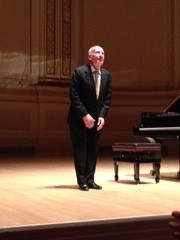|
Back
The Sculptor At Work New York
Isaac Stern Auditorium, Carnegie Hall
10/11/2015 -
Robert Schumann: Allegro in B Minor, Op. 8 – Fantasy in C Major, Op. 17
Frédéric Chopin: Barcarolle in F-sharp Major, Opus 60 – Nocturnes, Opus 55 – Polonaise-fantasie in A–flat Major, Opus 61 – Scherzo No. 3 in C-sharp Minor, Opus 39
Maurizio Pollini (Pianist)

M. Pollini in Carnegie Hall (© Paul Ehrlich)
Maurizio who?
Of course it was Maurizio Pollini, the 73-year-old Titan of the Steinway, perhaps the most revered pianist alive today, in the first of three concerts. Yet at the end of this recital and three gorgeous encores, the name Pollini was third down on the list. On the top was Chopin, below that was Schumann. And third was Mr. Pollini himself, the tool, the apparatus, the instrument to bring those composers to life, to celebration.
After listening to one unfamiliar Schumann work, the familiar C Major Fantasy, and a slew of over-familiar Chopin, one felt transported back to the mid-19th Century. Not for Mr. Pollini’s idiosyncrasies or exaggerations or hyper-Romantic frills, about which he had none. But because he offers what can clumsily be called an Original Truth to the music.
Had Schumann and Chopin heard Pollini, they might have nodded their heads and says, “Yes, we’ve heard the flash and filigree, we’ve wondered at the wunderkinder whose fingers become quarks and meteors. We’ve been astonished at Russian Supermen who turn the piano into terrorist bombs. And we’ve listened with fascination as singular artists stroke the keys like jewelers cutting diamonds, transporting notes into gemstones.
“But Maurizio Pollini is playing the music we envisioned in our own minds before it was confined to symbolic dots, and outrageous personalities.”
If this sounds like an excuse to procrastinate writing about yesterday afternoon’s concert, that’s right. Let’s just say that Mr. Pollini gave utter satisfaction.
He began with a Schumann work which I had never heard on the concert stage, or anywhere else. And while the early Allegro rambled on a bit, Mr. Pollini played it with controlled animation, emphasizing a strange theme from the chimes of a clock.
From here on, Mr. Pollini’s program essayed the familiar, like a traveler who knows every landmark, fauna and flora, ready to sketch it out both in chalk and paint. Schumann’s C Major Fantasy was never given nuances of color, never strayed from its path. No excess emotion here. The dolce passage was never cloying, it was tranquil. The “agitation” rarely got out of hand, never leaned back to assure applause (albeit with a few slips of the fingers). (The only “Bravo” at the end of the first movement was an embarrassment not to be repeated.) The march was hardly military. It was almost ingenuously simple.
Where Mr. Pollini came into his own was the finale, an exercise in understated sublimity. I have heard this with more spontaneity, most faux-improvisation. Mr. Pollini is on the cusp between grandiose 19th Century emotion and today’s sense of new discovery. He didn’t “discover” the meaning of the last movement. He played it with an understated nobility. One was awed not by the playing but Schumann’s own Beethoven-inspired stillness.
The second half was devoted to Chopin, and a tribute to Mr. Pollini’s honesty. He has been criticized for “over-analysis”, representing more science than art. But science, as he well knows, is an art. And if he chose Chopin’s emotion prudently, he never held back when necessary. Not in the encore “Revolutionary” Etude or the two scherzos did he refrain from showing his power. But this was a power that was firmly in bounds.
More frequently, Mr. Pollini let the Chopin sing–within limits. The composer loved his Bellini, but he wrote from the piano. And when Mr. Pollini allowed the cantabile sounds in the two Opus 55 Nocturnes, one felt not so much dream as beautifully-crafted music.
One etude, one ballade and one nocturne finished the concert, all played with precision, with an innate balance and with phrasing so very very careful. One felt that the cries for “Encore” were less visceral than homages to an artist who has kept the faith, and enabled even the most familiar Chopin to show its inner essence.
True enough, some may have been disappointed that Mr. Pollini’s “modern” period was missing, but they will have their chance. Music by Schoenberg paired with sonatas by Beethoven will give the other side to the Pollini phenomena on October 25. Yesterday afternoon, we heard not so much the skull beneath the skin, as a quiet truth beneath the notes.
Harry Rolnick
|